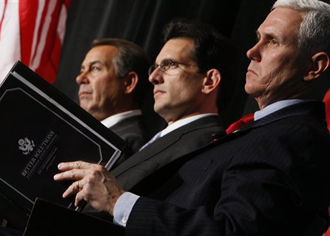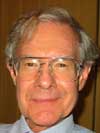| Home | Blog | Ask This | Showcase | Commentary | Comments | About Us | Contributors | Contact Us |

Republicans are locked in a passionate embrace with a corpse and won't let goCOMMENTARY | February 42, 2010Efficient market theory dominated economic thinking from the days of Ronald Reagan to the collapse of 2008. It was the rationale for deregulation, the cause of a massive transfer of wealth and income from the middle class to a tiny number of the very rich. Now it is dead and gone but Republican politicians won’t let go, and many in the media show no understanding of the issue. (Part of our series on "Reporting the Economic Collapse") In his meeting with the Republican caucus in Baltimore President Obama repeatedly invoked the opinions of economists, and at one point, specifically referred to “credible economists,” and later referred to a "consensus among people who know the economy best.” Shouldn’t we be asking who he is talking about?
This is obviously a very important question. But if it is an important question for the President, it is an equally important question for the media and the public. A very strong case can be made that the Great Recession resulted from a blind faith in an economic theory that was simply wrong. It is no longer possible to treat economic theory as an arcane academic matter of no interest to practical people. If it was a bad theory that got us into trouble, maybe we need another theory. Of course the Republican opposition is clinging to their old faith like grim death. At stake is the very essence of their political philosophy. But the media show no understanding of what is at issue.
It has long been fashionable for journalists to finesse the question of whose opinion they should take seriously by taking an informal poll of a selection of economists in hope of finding some kind of consensus. This method has an advantage: it requires a minimum of work, needs little thinking or judgment, and there is very little risk of confronting dissent from the conventional thinking.
This is not an easy problem for most journalists. Surely some economic opinions are better than others, but which? Over the last two years events have done a lot of sorting out for us. I suggest that a useful beginning can be made by looking at what the economic collapse has done to the profession and the credibility of its various practitioners. We can start by dividing economists into three groups.
First are those employed by Wall Street and various commercial interests. These are the ones the media usually turn to. They provide most of the “expert commentary” on cable television, and many fine, competent economists are among them. They seem to be pretty good at doing the math on specific short term issues. But I suggest that this is the wrong group for anyone looking for an impartial policy judgment. It is unfair to ask anyone for an unbiased opinion when an honest answer could be inconsistent with the interests of an employer or important client. Indeed, the opinions of this group are usually well-reasoned, articulately expressed, and totally predictable. They represent the interests of their employers.
The first group has a lot of overlap with the second, which has even less claim to credibility. These are economists whose work has been grounded on the “efficient market hypothesis,” and until the financial collapse of 2008 their views dominated in large parts of the academic world and almost all of the political. Central to their thinking is the idea that markets will always accurately, rationally and efficiently value assets. The concept of a “bubble” is unthinkable: since it can’t happen, it therefore didn’t.
Even before the collapse the theory was badly damaged. The failures of Long Term Capital Management, Enron, WorldCom, the stock market crash of 1987, and the collapse of the dot-com bubble had left it in serious trouble. But after 2008, as Alan Greenspan, one of its main proponents for many years, told a Congressional committee, the “whole intellectual edifice collapsed.” The “efficient market” still has its hard core defenders but their ranks are in disarray and suffering notable defections. This has been described in considerable length by Justin Fox in his book “The Myth of the Rational Market.” A shorter version is in Ken Davidson’s “Reality be Damned, The Legacy of Chicago School Economics” in The American Interest, November/December, 2009. More recently the story has been given a gossipy treatment in a recent article in the New Yorker by John Cassidy (January 11, 2010). Perhaps the most devastating is the remarkable mea-culpa by Judge Richard Posner in the New Republic: “How I Became a Keynesian,” (September 23, 2009).
Despite catastrophic events, it is folly to expect the suffering of millions and an onslaught of inconsistent facts to wipe out an economic theory whose tenets were and still are so convenient for so many powerful economic interests. At present the defenders of the efficient market hypothesis are engaged in trying to pin the cause of the financial crisis on the government. (If the financial crisis was the result of government policies, then one could still plausibly claim the market to be rational, efficient, etc.) Their targets include the mortgage practices of the quasi-government lenders, Fannie Mae and Freddie Mac, the Community Reinvestment Act of 1977, the low interest rates of the Federal Reserve, and a pessimistic speech by President George W. Bush. The problem with this “blame-the-government” approach is the disproportion between these purported causes and economic effects. As Paul Krugman noted,
“[N]one of the proposed evil deeds of policy makers were remotely large enough to cause problems of this magnitude unless markets vastly overreacted. That is, you have to start by assuming wildly dysfunctional markets before you can blame the government for the crisis; and if markets are that dysfunctional, who needs the government to create a mess?”
The proponents of the efficient market theory provided the intellectual basis for our national economic policy since Reagan. They used it to justify the massive transfer of wealth and income from the middle class to a tiny number of very rich. It was their arguments that justified financial deregulation. It was their policies that led inexorably to the Great Recession. It is their thinking that still underlies the stultifying clichés that prevent any decent media coverage of economic issues.
The defenders of the efficient market are displaying a stunning myopia as to the sheer scale of the economic catastrophe that has fallen on ordinary Americans. Over 15 million unemployed, 8 trillion dollars lost in the housing market, millions of families have lost their income, their savings, their home, their medical insurance, and have been driven into bankruptcy. We are still waiting for a modest expression of remorse.
The third group has the strongest claim to be taken seriously. Numerically they are probably the smallest. But they include people with impressive credentials, Nobel prize winners, chairmen of departments at great universities, tenured professors, editors of scholarly journals, etc. Their claim to credibility in the current crisis comes from the fact that they are not guilty of the policies that took the economy off a cliff. At this point it is tempting to start making lists. But it is more useful to explore what it is that characterizes their economic thinking, and in particular to note those concepts that can be said to have survived the collapse of the last two years. While there is a great deal of diversity in thinking among these economists, it is important to recognize that there is a remarkable amount of agreement on certain points central to our current crisis.
The first point is that markets do not always accurately and efficiently value assets. All markets, to one extent or another, are vulnerable to irrational speculation. Internal market forces can produce speculative bubbles followed by damaging collapses. Historians have long recognized the persistence of boom and bust in the economy.
Second, the government has a large role to play in attempting to keep the economy stable and providing the necessary correction in the event of either inflation or recession, and more broadly, by providing the non-market institutions necessary for a prosperous society. Monetary policy is the principle tool of government stabilization policy, but if that fails, fiscal measures may be necessary. In any case, there is no reason to expect that the economy will restore itself to full employment in a serious recession.
Third, the regulation of financial markets is essential for the maintenance of a healthy economy. It is a lesson of history that without such regulation financial markets perform poorly and can fail to attract adequate capital.
Fourth, the benefits of a free market economy are not always distributed in ways that are efficient, fair or consistent with economic stability. We frequently hear that consumer demand is the engine that drives the economy but the massive shift in wealth and income from the middle class to the top one percent has done much to imperil the stability of the economy.
What seems most difficult for the media to comprehend is that the economic collapse was an intellectual failure. It followed from an unquestioning faith in an economic theory that was simply wrong. It produced an economic policy that was explicitly grounded on false assumptions. But the nostrums of this failed policy have been the unquestioned basis of our economic policy for thirty years. They were translated into political mantras that were endlessly chanted by our political and economic leaders. The notion that they led us into a disaster has not sunk in to the public mind, much less that of the media. The media find it safer to avoid the basic economic issue and treat it all as a matter of politics. We have yet to hear David Gregory on Meet the Press, or any of his colleagues, ask a Republican leader how their current policies differ from those of George W. Bush or why we should expect them to produce different results.
The reluctance of the press to face this question has several sources. Obviously there is a fear of appearing partisan. While certainly the Clinton Administration and other Democrats bought into the efficient market concept, most of its proponents and its strongest supporters have been Republicans. Indeed, what characterizes the Republican party at present is a complete failure to recognize the collapse of its basic economic principles. It is locked in a passionate embrace with a corpse. Who wants to risk the wrath of Glenn Beck and Rush Limbaugh by telling them?
Many who promote efficient market the loudest have always sought to identify their curious ideology with capitalism itself. This has the advantage of making it easy to label all opposition as “socialism.” The inconsistency of this with economic history doesn’t seem to bother them. J.M. Keynes was not a socialist, as even Judge Posner has discovered. Unfortunately, most of the press doesn’t seem to have discovered it, the reason being, I surmise, that even a casual acquaintance with economic history is rare among journalists.
The political implications of the collapse of conventional economic thinking are enormous. The media that greeted Ronald Reagan’s conservative revolution as a new era of enlightenment are completely lost. The public is frightened and confused. What happened runs counter to everything they have heard for 30 years. Could the sainted Reagan really have been wrong? The policies necessary to deal with the catastrophe are inconsistent with everything we were led to believe. But President Obama is reluctant to give us a real lesson in economics and is opting to combine some of what is necessary with a lot of out of dated rhetoric.
No wonder we have a tea bag movement.
|
||||||||||||




